How to Get Rid of Acne Scars on Cheeks
Treatments for acne scars are typically intensive, the best results coming from lasers, injections and fillers best handled by medical professionals, experts told us. There are, however, some solid home treatments you can consider if you want to improve the appearance of acne scars. To understand how some of these at-home treatments work — and what their limitations are — we consulted dermatologists and found some highly rated options to consider based on their guidance.
Before you choose an at-home treatment, it's important to understand what acne scars are, what they aren't and when to differentiate them from hyperpigmentation, dark spots caused by inflammatory skin issues like acne and eczema, according to board-certified dermatologist Corey Hartman, MD. While hyperpigmentation can fade away on its own within 12 months, acne scars are permanent textural changes like bumps and roughness, according to Hartman. Since people with darker skin tones naturally have more melanin in their skin, they are more likely to experience hyperpigmentation due to those aforementioned inflammatory skin issues, explained Arisa Ortiz, MD, the director of laser and cosmetic dermatology at UC San Diego.
SKIP AHEAD Best acne scar products
Inflammation from blackheads, whiteheads and cystic acne — large and sometimes painful breakouts — can damage skin tissue and result in acne scars, too, noted board-certified dermatologist Michele Green, MD. She said the "best way" to avert acne scars is to treat and prevent breakouts from occurring in the first place.
There are hundreds of anti-acne products on the market, including acne face washes, acne spot treatments and acne sunscreens. If you need help creating a routine or just want professional guidance, the MDs we consulted recommended consulting your local board-certified dermatologist. To that end, we highlighted a few dermatologist-recommended ingredients that can help treat your current breakouts and prevent new ones and acne scars from forming.
Best skin care ingredients for treating acne, according to doctors
- Salicylic acid dissolves oil, unclogs pores and prevents buildup from occurring, board-certified dermatologist Marisa Garshick, MD, recently told us in our guide to blackhead treatments.
- Azelaic acid inhibits tyrosinase, an enzyme that creates pigment in the skin and decreases the production of acne-causing bacteria, according to board-certified dermatologist Eileen Deignan, MD.
- Retinol is a vitamin A derivative that boosts skin exfoliation and prevents acne. It also promotes skin cell turnover and collagen production treating post-acne hyperpigmentation and minimizing the appearance of current acne scars, according to Deignan.
- Alpha-hydroxy acids (AHA) unclog pores and exfoliate skin, thus reducing acne, fixing uneven skin texture and preventing some acne scars from forming and improving ones already present on the skin, noted Green.
- Vitamin C is a "powerful antioxidant" that can help reduce the appearance of redness and pigmentation from acne scars. It also helps prevent some acne scars from forming, according to Green.
Best at-home acne scar treatments
Simply put, treating acne scars requires work by medical professionals. Reducing signs of acne, however, can be done at home. If you want to minimize the appearance of acne scars, there are expert-recommended at-home treatments made from beneficial ingredients like adapalene, retinol and AHAs.
Differin Gel Adapalene Gel
Differin Gel is the No. 1 bestselling skin care product among Shopping readers in 2020 and it earned a recommendation from Garshick who noted it contains adapalene, an ingredient that prevents breakouts, treats acne and improves acne scarring. She advised you use it only a few times a week to start and increase the frequency to once daily as necessary. Differin Gel boasts a 4.5-star average rating from more than 31,580 reviews on Amazon.
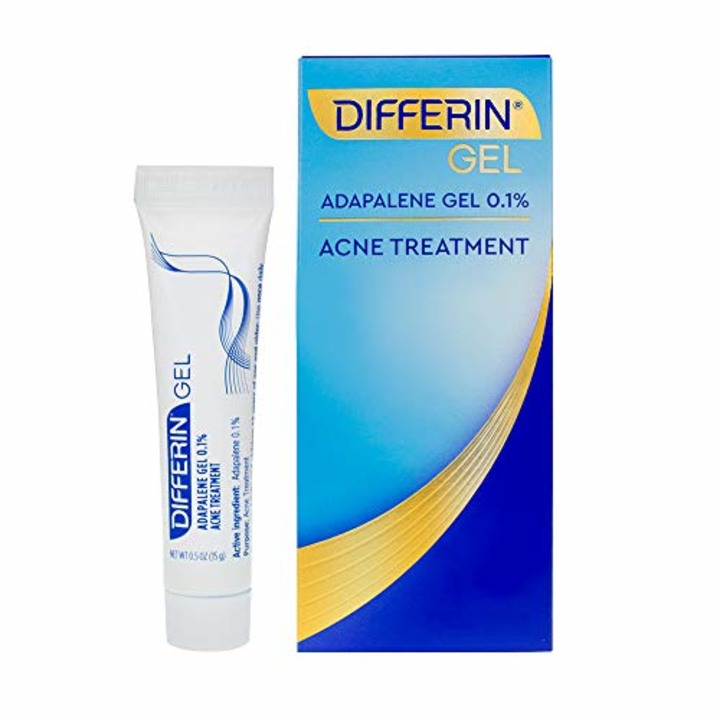
Alpha-H Beauty Sleep Power Peel
Board-certified dermatologist Eileen Deignan, MD, likes tretinoin, a prescription-strength retinoid, but noted that an over-the-counter alternative is a retinol serum since both products can rebuild collagen caused by acne inflammation. As one of the best retinol serums for acne, Alpha-H's Power Peel combines 0.5 percent retinol with 14 percent glycolic acid, an AHA known for helping the skin glow. Alpha-H's retinol serum earned the Clean at Sephora seal of approval, meaning it's free of more than 50 ingredients the retailer considers questionable. Alpha-H's Power Peel received a 4.8-star average rating from 12 reviews on the brand's site.
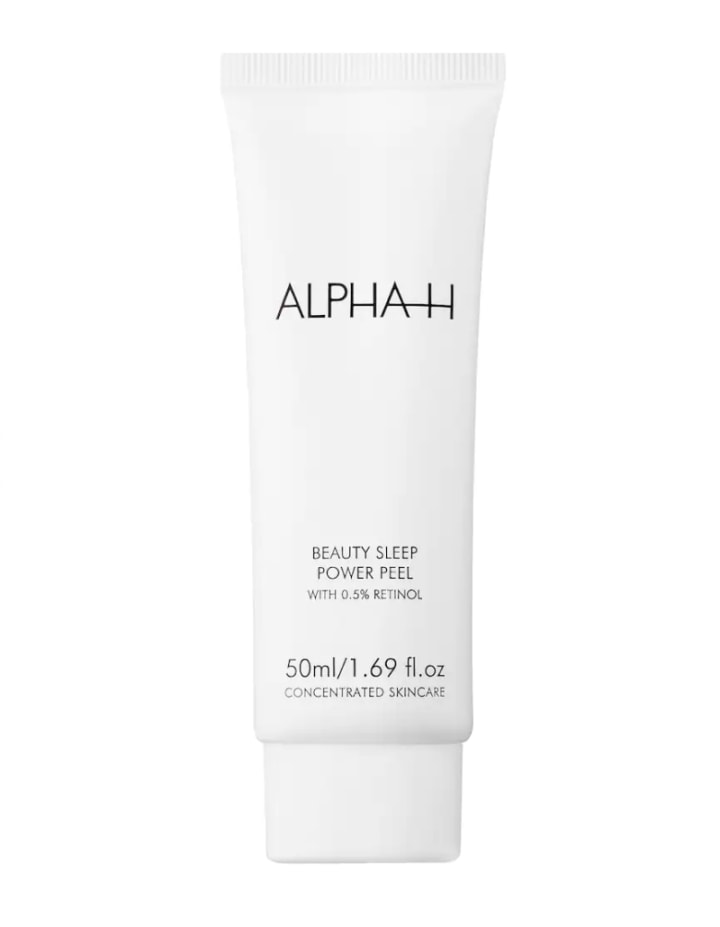
Drunk Elephant A-Passioni Retinol Cream
Drunk Elephant is a popular Clean at Sephora-approved skin care brand and Hartman called its retinol serum "good." Beyond containing a blend of 1 percent retinol and anti-aging peptides, A-Passioni boasts vitamin F, which is known for helping to improve the skin's texture. It is also made with hydrating ingredients — marula and jojoba oils — to help prevent dryness typically associated with retinol. A-Passioni boasts a 4.2-star average rating from nearly 1,170 reviews on Sephora.
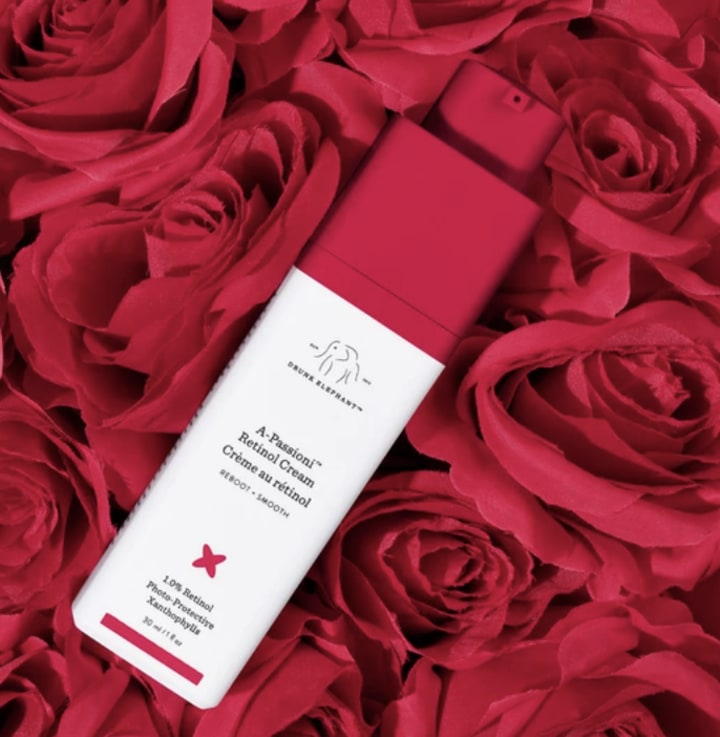
La Roche-Posay Effaclar Adapalene Gel Acne Treatment
If you're looking for a readily accessible and relatively affordable topical treatment, Hartman recommended La Roche-Posay's Effaclar gel, which he said "can deliver impressive results." It contains adapalene which can help heal acne scars, as previously mentioned by Garshick. This fragrance-free spot treatment has an oil-free and non-comedogenic formula, meaning it won't cause breakouts. Effaclar earned a 4.6-star average rating from nearly 2,920 reviews on Amazon.
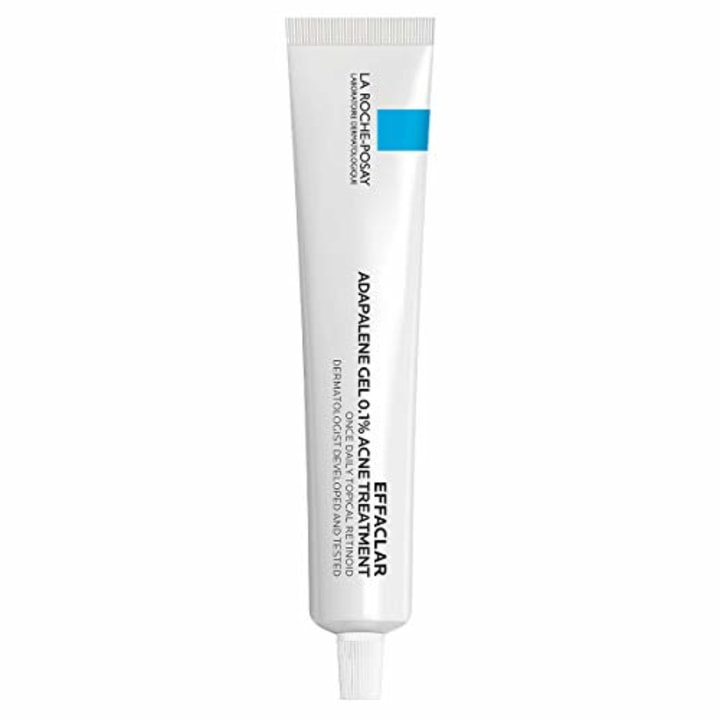
BeautyBio GloPRO Regeneration Tool and Face Attachment
Microneedling is when tiny pins "vibrate" back and forth on the skin and create "micro injuries" that help stimulate collagen production and smooth out the skin's surface, according to Hartman, who provides medical-grade microneedling treatments at his practice.
Although Hartman said he hasn't used at-home microneedling kits, brands like Ora and Beauty Bio make top rated microneedling tools. Beauty Bio's for example, received a 4.5-star average rating from nearly 190 reviews on Amazon and it comes with prep pads, an empty sanitizing bottle and power adapter. At-home microneedling kits like Beauty Bio's won't penetrate the skin as deep as professional-grade treatments, which is why the brand recommends utilizing the device up to three times a week. (Professional microneedling takes place over the course of six to eight treatments scheduled every four to six weeks, Hartman noted.)
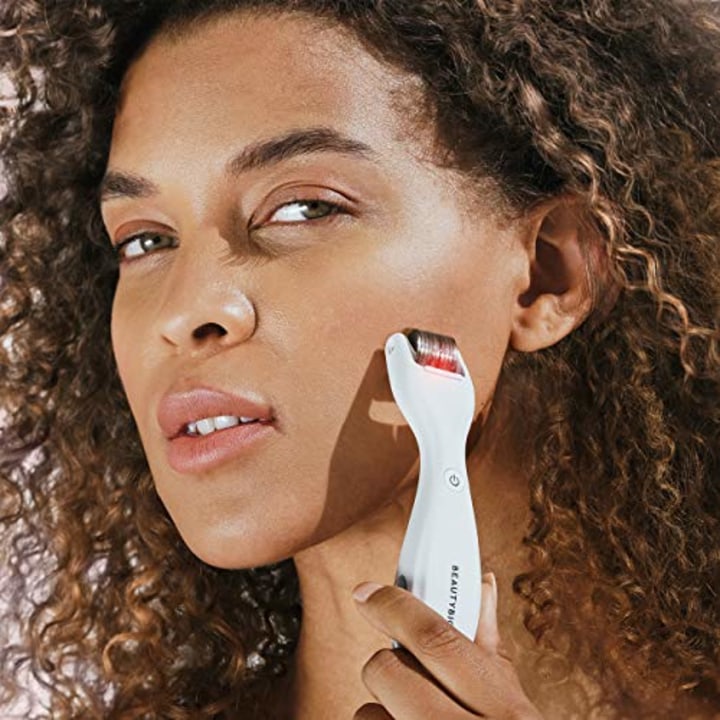
Types of acne scarring
To help you identify which type of acne scar you might be dealing with, we also put together a quick at-a-glance view of common acne scars. While they all vary in appearance, Hartman highlighted these names are just descriptors for the different shapes of acne scars. "They're all the same thing and just come about from different severities of acne breakouts and lesions," he said.
Depressed scars
Board-certified dermatologist Hadley King, MD, noted all three of these scars commonly occur on the cheeks and typically result when the body doesn't produce enough collagen when healing.
- Icepick scars are narrow and deep in the skin, noted board-certified dermatologist Michele Green, MD. They are typically caused by pustules, which are small, white and pus-filled pimples that are usually surrounded by redness, added Hartman.
- Boxcar scars are broad depressions with sharply defined edges, according to Green, who also serves as a clinical instructor of dermatology at Mount Sinai Hospital.
- Rolling scars are broad with sloping edges, added Green.
Raised scars
A raised scar typically occurs if the body produces too much collagen during the healing process, according to King. Keloid scars are raised and hairless scars that are usually pink, red or flesh-toned and common in those with darker complexions. Keloids can "grow larger over time" and may turn darker than your usual skin color when exposed to the sun, according to a report from the University of Michigan Health System.
How to prevent acne scars from forming
- King advised resisting the urge to pick your pimples, otherwise it can cause acne scars, infections, hyperpigmentation and inflammation.
- Even if you're diligent about not picking your acne, sometimes pimples may leave behind marks and scars. In those instances, King advised that it's best to "control it as well as possible" by utilizing skin care products rich in anti-acne ingredients like salicylic acid, benzoyl peroxide and adapalene.
- When you notice an inflamed acne is forming, she advised going to a dermatologist for an intralesional cortisone injection because it helps decrease inflammation and the potential of scarring.
Catch up on Select's in-depth coverage of personal finance, tech and tools, wellness and more, and follow us on Facebook, Instagram and Twitter to stay up to date.
How to Get Rid of Acne Scars on Cheeks
Source: https://www.nbcnews.com/select/shopping/best-acne-scar-treatments-ncna1273575